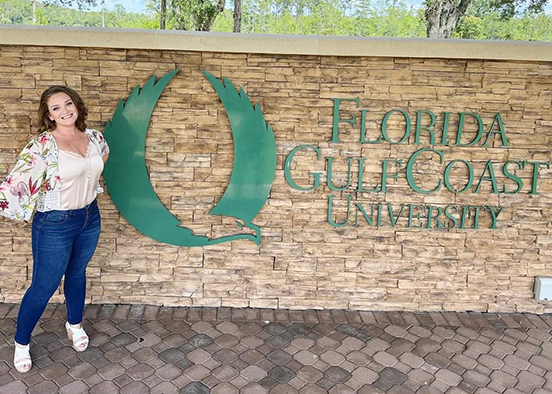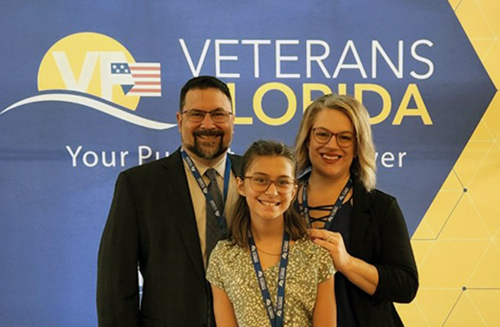It’s never too late to chase one’s dreams, and Florida Gulf Coast University embraces this philosophy as it focuses on the nontraditional student’s desire to return to college.
A year-old nontraditional student task force has been looking at ways to engage the Southwest Florida population beyond FGCU Complete, a program already in place designed to support post-admissions nontraditional students who already have completed 30 or more college credits, but whose higher education was interrupted because life had other plans. The work of this task force has already made FGCU a more welcoming and supportive environment for this audience of students.

Such is the story of Casey Benitez, a married mother of three who returned after a 15-year hiatus to pursue a degree in psychology at FGCU.
“In 2007, I earned my (associate degree) and worked as a pharmacy technician,” Benitez said. “At the time, the pharmacist I worked for encouraged me to pursue becoming a pharmacist.”
That was Benitez’s original plan, but after some experience in the pharmaceutical field, she decided that was not the right option as she planned her return to school.
“I stopped wanting that career years ago when administering immunizations became part of it,” she said. “I wanted to help people without having to touch them, let alone poke them.
“During my time of becoming a stay-at-home mom, I joined an MLM (multi-level marketing) mission I fell in love with,” Benitez continued. “It gave me an opportunity to help people by learning and sharing knowledge about sexual health. I had always liked the idea of becoming a therapist, so after years of working with people on some of their most intimate concerns, I knew I had to return to school and major in psychology. I want to be able to focus more on helping people than what I can sell them.”
Coming back to school can be nerve-wracking, even for students who previously attended college. Benitez expressed her fear of the unknown. “I’m definitely nervous to return,” she said. “Already dreaming about being late to class, even though all the ones I’m starting with are online courses. Probably one of my biggest concerns is just the uncertainty of what my new life schedule will look like.”
Nontraditional students such as Benitez can face policy and procedural challenges in returning to school, so Lisa Johnson, Ph.D., associate vice president for enrollment management at FGCU, said the task force was created to smooth the move. “Our job was to look at all the policies, regulations and support from recruitment/admission through graduation … everything around the nontraditional student,” Johnson said. “To see where there were barriers or where our policies weren’t nontraditional-student friendly, and try to identify places where we could improve. So, the task force has worked a whole year, and we’ve already accomplished quite a lot of things. So we’re pretty happy with that.”
One of the major changes is establishing a new team in undergraduate admissions that provides wrap-around services to nontraditional students and complements teams dedicated to freshmen, transfers and international students. The new team works with nontraditional students no matter where they’re entering.
“For instance, you could be a 40-year-old woman who has decided to attend college after having children, and doesn’t have any college credits,” Johnson said. “This team would help navigate you to what application to complete, how to apply for any kind of aid or scholarships, and would help you through the whole on-boarding process, including how to transition you to the campus.”
Sometimes college isn’t a feasible option immediately after high school, and coming back can be intimidating, no matter the age. The speed at which higher education progresses, such as from a technological standpoint, can lead to apprehension and anxiety, making it difficult for one to take that first step.
“Think about the veteran who has done several tours of duty for us, served our country, and then we say apply online,” Johnson said. “Maybe that person hasn’t had access to computers while serving. Maybe the flip phone was still being used when he or she left for duty. Well, we don’t want that veteran to get frustrated. We want to help that veteran right through the process so that veteran can get the correct application completed, get those veterans’ benefits that he or she has earned, and be able to get that degree to complement the skills that were learned in the military.”
To smooth the return, FGCU has promoted Jenna Smith to senior assistant director of nontraditional admissions, and hired a nontraditional admissions counselor, to help guide these newcomers to higher education on their new journey.
“If students search ‘nontraditional’ or if they call us, we can guide them” Smith said. “They can also schedule an appointment with us by phone or by filling out what we call an inquiry form. We meet with students – in person, virtual, over the phone at a time that works for them.”

That’s how the new journey can begin at FGCU. And it really is never too late.
Take Melannie and Lloyd Duhon, parents of eight. Melanie plans to graduate in December with a bachelor’s degree in interdisciplinary entrepreneurship and a minor in agribusiness. Lloyd, who served in Somalia with the U.S. Army in the 1990s, took part in the Veterans Entrepreneurship Program, a statewide initiative implemented by FGCU for those who served and look to start a business.
When the pandemic hit and brought supply-chain disruptions with it, the Duhons, originally from Rochester, N.Y., decided to start a self-sustaining business: Living Greens Urban Farm in Cape Coral.
“It’s an indoor, vertical, hydroponic farm where we grow microgreens, baby lettuce, herbs and edible flowers,” Melannie Duhon said. “We sell our produce at local events and through our online store. We also are in the process of developing an app to help local farmers.”
Established in late 2020, Duhon said Living Greens has 400 square feet of grow space that is “scalable to grow 500 pounds of produce each week.”
“It was born out of the desire to feed our family and community nutrient-dense, fresh food using alternative, eco-friendly farming methods,” Duhon said. “Our focus is on building community resilience and sustainability. We are ever evolving in urban farming techniques to expand our food selection.”
Indeed, as Benitez and the Duhons prove, when life experience is combined with higher education, the possibilities are limitless regardless of age or economic status. Take Academy Award-winning actor Denzel Washington, who returned to college after a 34-year hiatus. During his commencement speech, Washington stated that, “Dreams without goals remain dreams.”
For those whose unfulfilled dream is to earn a university diploma, FGCU is determined to help make it happen.
— Jonathan Pressley is a senior communication major whose part of an internship program with FGCU Marketing & Communications. Students looking for a paid writing internship should contact Keith Gibson at [email protected].